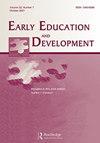Investigating the Development of Positive Peer Interactions in Low-Income Latino DLL Preschool Children
IF 2.2
3区 教育学
Q1 EDUCATION & EDUCATIONAL RESEARCH
引用次数: 0
Abstract
ABSTRACTResearch Findings: There is limited research regarding socio-emotional development in low-income Latino Dual Language Learner (DLL) children. A total of 14 studies have been identified in a comprehensive review of the literature (Halle et al. 2014). Within these studies the majority have focused on problem behaviors within this population. Through a strength-based lens, the current study examined changes in the development of positive peer interactions of Latino DLLs across their preschool year, along with child-level and eco-cultural factors that may support this development. A total of 397 low-income preschool Latino DLL children participated in the study. Teachers completed the Penn Interactive Peer Play Scale (PIPPS-T) and the Preschool Learning Behaviors Scale (PLBS), children were assessed on oral language measures, and classroom observations took place using the CLASS. Findings indicate positive increases in Latino DLL children’s play interaction skills, along with decreases in problem behaviors across the preschool year. Emotional support, teacher’s Spanish proficiency, oral language skills, and approaches to learning were positively related to peer interaction scores.Practice or Policy: This study has important implications for practitioners regarding improving the positive peer interactions of Latino DLLs, specifically low-income children, enrolled in preschool classrooms and supports the use of the home language in the classroom. Disclosure StatementNo potential conflict of interest was reported by the author(s).Additional informationFundingThe work was supported by NIH-NICHD [5U01HD060296].调查低收入拉丁裔DLL学龄前儿童积极同伴互动的发展
研究发现:关于低收入拉丁裔双语学习者(DLL)儿童社会情感发展的研究有限。在对文献的全面回顾中,共确定了14项研究(Halle et al. 2014)。在这些研究中,大多数都集中在这个人群的问题行为上。通过基于优势的视角,本研究考察了拉丁裔dls在整个学龄前期间积极同伴互动发展的变化,以及可能支持这种发展的儿童水平和生态文化因素。共有397名低收入的学龄前拉丁裔DLL儿童参与了这项研究。教师完成了宾夕法尼亚大学同伴互动游戏量表(PIPPS-T)和学前学习行为量表(PLBS),对儿童进行了口头语言评估,并使用CLASS进行了课堂观察。研究结果表明,拉丁裔DLL儿童在游戏互动技能方面有积极的增长,在整个学前阶段,问题行为也有所减少。情感支持、教师的西班牙语熟练程度、口语技能和学习方法与同伴互动得分呈正相关。实践或政策:本研究对在学前班注册并支持在课堂上使用母语的拉丁裔非母语儿童,特别是低收入家庭儿童,在改善积极的同伴互动方面具有重要意义。披露声明作者未报告潜在的利益冲突。本研究得到了NIH-NICHD [5U01HD060296]的支持。
本文章由计算机程序翻译,如有差异,请以英文原文为准。
求助全文
约1分钟内获得全文
求助全文
来源期刊

Early Education and Development
Multiple-
CiteScore
5.50
自引率
10.30%
发文量
78
期刊介绍:
Early Education and Development (EE&D) is a professional journal for those involved in educational and preschool services and research related to children and their families: early education supervisors, school psychologists, daycare administrators, child development specialists, developmental and child clinical psychologists, and special education administrators. It is designed to emphasize the implications for practice of research and solid scientific information. The age range focused upon is preschool through the primary grades. EE&D is a connecting link between the research community in early education and child development and school district early education programs, daycare systems, and special needs preschool programs.
 求助内容:
求助内容: 应助结果提醒方式:
应助结果提醒方式:


